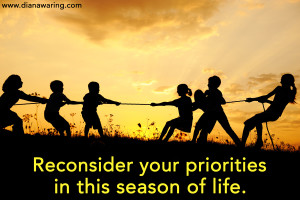 When we consider how—or if—we are going to accomplish all the things on our to-do list (especially as we consider the upcoming school year), we need to ponder our priorities.
When we consider how—or if—we are going to accomplish all the things on our to-do list (especially as we consider the upcoming school year), we need to ponder our priorities.
Here are four steps to help you:
Step One.
Ask yourself these critical—though often overlooked—questions:
- What opportunities should my children not miss? Why?
- How do I give them childhood memories that will enrich their lives?
- When should we stick to our books and when should we play in the sunshine?
- Where does our schedule allow for creativity, imagination, and exploration?
To ponder these questions means you take time to consider the big picture. Here are five big picture points:
Ask yourself what is important to you, to your family.
Think about about where you want to end up, about the goals you have for your family, about the future you envision.
Ask yourself what you want to include on this homeschooling journey.
Ask your kids what is important to them right now, what they would enjoy doing in this coming year, what their dreams are for their future.
Seek the input of others—spouse, friends, family.
Step Two.
Now, gather up all the richness being generated with these ideas—from your pondering, from your children, and from what others have shared. Open your journal or lesson planner and write down some specific answers to the critical questions listed above.
Really. Write them down. It will provide you a written reminder for those days when you’ve lost sight of the big picture.
Step Three.
With your written answers in hand, consider your overall timetable:
- Are you planning to homeschool long term? If so, you have more freedom to experiment with your schedule, more time to evaluate how it’s working.
- Are you planning to homeschool this year and see how it goes? If so, you will need to look regularly at your priority list so that you can adjust it as needed.
Remember, just like Rome, homeschooling is not built in a day. Rather, it’s accomplished over a series of days, weeks, months, and years. Having the longterm view in mind, as you face the daily challenges, changes your perspective!
Step Four.
Plan your to-do list. If your to-do list looks like the following, you may want to reconsider your priorities in this season of life:
- Clean my house thoroughly, including behind the refrigerator and behind each book in the library.
- Prepare every meal from scratch, including butchering the chicken, milking the cow, making cheese, growing organic wheat, grinding it, and baking bread.
Growing flax and cotton, and raising sheep for fiber. - Spinning and weaving the fiber into fabric.
- Sewing every bit of clothing my family wears—by hand.
- Write my own curriculum on paper I made from papyrus.
- Build a computer from parts scrounged in a thrift store.
- Teach my children everything they will ever need to know—this week.
It might be more reasonable to start with something like this:
- Love my family.
- Feed them.
- Read to them.
- Pray with them.
- Teach them bite-sized information, appropriate to their ages.
With your answers to those critical questions, with a workable timetable, and with a reasonable to-do list, you will be prepared to sort out and accomplish YOUR priorities!

